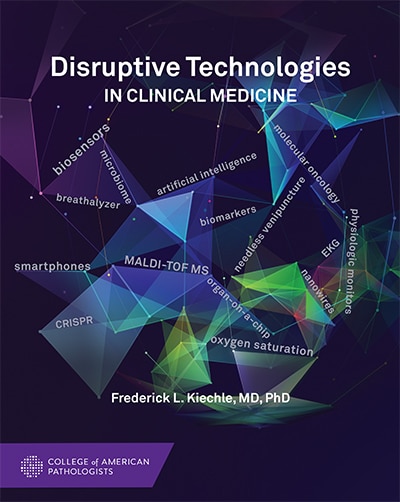September 2023—Laboratory testing for paraneoplastic neurologic syndromes is neither commonplace nor cheap. It also comes with its own enigmatical math, as Michael Levy, MD, PhD, recently experienced. As the director of the Neuroimmunology Clinic and Research Laboratory in Massachusetts General Hospital’s Department of Neurology, Dr. Levy keeps an eye on PNS laboratory testing (which is performed at Mayo Clinic) at his institution.
September 2023
Many knots to untangle in lab test names
September 2023—Ambiguities, inconsistencies, omissions, and other defects in the naming of laboratory tests can send test orders and results interpretation awry, particularly with some of the most common tests. Even among clinicians and laboratorians working at the same hospital for years, smooth sailing is not guaranteed. The authors of a study published in Archives of Pathology & Laboratory Medicine hope to change that. Their aim is to alert patient-facing providers and laboratories to the risks that ambiguous or nonstandardized laboratory test naming poses and to provide practical rules for minimizing those risks.
For infectious disease, what tests and at what time in disease course
September 2023—For the tickborne and mosquito-borne arboviruses, which are frequently more transient in blood and tissue than other pathogens, both molecular and serologic testing have a place in the diagnostic toolkit.
Read More »Lab’s steps to fewer contaminated urine cultures
September 2023—A casual comment made in a routine exchange in an Avera McKennan Hospital laboratory sparked a five-year campaign to bring down the urine culture contamination rate. “I feel like all I do is report contaminated cultures,” a microbiology technologist said in 2016.
Read More »New viscoelastic testing requirement in checklist
September 2023—A proficiency testing accreditation requirement in the new checklist edition was revised to add clarification, and a new requirement on viscoelastic testing will close an existing gap.
Read More »People, partners, and platforms at the point of care
September 2023—Point-of-care testing—the requests and the committees that oversee them, the connectivity, what AI might bring. CAP TODAY publisher Bob McGonnagle on July 21 met online with a laboratory operations director and a medical director from large health systems and with company representatives for a look at where things stand today. Their conversation follows.
Disruptive technologies—what impact on lab workflow?
September 2023—New from CAP Publications is Disruptive Technologies in Clinical Medicine, by Frederick Kiechle, MD, PhD. In his new book Dr. Kiechle says “disruptive technologies offer new paradigms in diagnostic medicine.” Technology-driven disruptions are stimulated by the need to improve patient care, he writes, and they have been “a feature of the practice of clinical pathology since the inception of the first clinical laboratory in 1895 at the University of Pennsylvania, the William Pepper Laboratory.”
Read More »AMP case report: Lung micropapillary adenocarcinomas revisited
September 2023—CAP TODAY and the Association for Molecular Pathology have teamed up to bring molecular case reports to CAP TODAY readers. AMP members write the reports using clinical cases from their own practices that show molecular testing’s important role in diagnosis, prognosis, and treatment. The following report comes from Henry Ford Hospital. If you would like to submit a case report, please send an email to the AMP at amp@amp.org. For more information about the AMP and all previously published case reports, visit www.amp.org.
Read More »Genetic counseling within the laboratory: For oncology cases, lab’s consult service plugs gap
September 2023—What happens when an oncologist cannot confidently determine what type of genetic test to order for their patient? Where can a provider turn if they do not know whether a genetic variant is clinically actionable? As genetic testing becomes a more integral part of personalized medicine and health care in general, there is a growing need to bridge the gap between those skilled in molecular diagnostics and those on the patient-facing side of care. In response to this need, the Center for Integrated Diagnostics (CID), a high-complexity molecular diagnostics laboratory at Massachusetts General Hospital, created its Consultation Service.
Read More »From the President’s Desk
September 2023—In the past two years, I’ve written a lot in this column about leadership and why pathologists make natural health care leaders. Effective leaders emerge from a process of continual self-correction in those who constantly seek out new ideas and hone their leadership skills.
Read More »Clinical pathology selected abstracts
September 2023—Approximately 30 percent of U.S. employees report that they have been bullied in the workplace, and these numbers are even higher for remote workers. Bullying is defined as any act or situation in which someone is subjected to recurrent, systematic, serious negative or hostile behavior and long-lasting acts designed to oppress or abuse another person. This behavior may include belittling, humiliating, personally attacking, verbally criticizing, or intentionally excluding a coworker. Bullying can harm both the target of the attack and the organization that employs the bully and the targeted person. The potential negative effects on an organization can be high staff turnover, a decrease in employee performance and productivity, and an increase in errors and medical mistakes.
Read More »Anatomic pathology selected abstracts
September 2023—Understanding of the pathologic and molecular features of endometrial cancer has advanced measurably since the FIGO (International Federation of Gynecology and Obstetrics) staging system was updated in 2009. New treatments, results of clinical trials, and prognostic survival data that correlate with pathologic and surgical findings have been reported. Therefore, the FIGO Committee on Women’s Cancer determined that changes to the FIGO system were necessary. The goals of the revised staging system are to further clarify the diverse biologic nature of endometrial carcinomas with differing prognostic outcomes, better define the prognostic groups, and create substages that yield more appropriate surgical, radiation, and systemic therapies. The cancer committee developed a subcommittee on endometrial cancer staging in October 2021, of which the authors are members.
Read More »Molecular pathology selected abstracts
September 2023—Neurodegenerative diseases are a broad group of disorders characterized by progressive loss of nerve cells in the central or peripheral nervous system. These diseases are often chronic and incurable, with symptoms ranging from cognitive decline to motor or sensory dysfunction. There are many types of neurodegenerative diseases, with various underlying etiologies. One group of diseases, the synucleinopathies, are associated with the misfolding and aggregation of the protein α-synuclein. This group includes disease entities such as Parkinson disease, dementia with Lewy bodies, and multiple-system atrophy.
Read More »Q&A column
September 2023 Q. Some recent clinical guidelines recommend lower therapeutic and toxic limits for digoxin than those provided in assay package inserts. What therapeutic ranges and toxic thresholds should laboratories use? Read answer. Q. One of our providers noticed that two laboratories—one in New York and one in Florida—reported very different thyroid-stimulating hormone values for a patient and called our laboratory to determine which was correct. How should we handle such situations? Read answer.
Read More »Newsbytes
September 2023—The musician Frank Zappa said, “One size does not fit all,” a declaration that counters the claims of many clothing manufacturers and holds true for a variety of products, including, one could argue, digital scanners.
Read More »Put It on the Board
September 2023—A wrist-worn high-sensitivity cardiac troponin I monitor was one of the wearable devices and health monitors highlighted in a session on emerging technologies for point-of-care testing at the Association for Diagnostics and Laboratory Medicine meeting in July.
Read More »Letters
September 2023—I read with interest “In anatomic pathology labs, a balancing act” (August 2023). Some of the roundtable participants highlighted an area of next-generation-sequencing–based diagnostics that is a blind spot for pathologists, molecular biology tool manufacturers, and laboratory information system vendors—namely how to reduce the fractional cost of performing NGS-based analysis. On the topic of gene panels, the participants offered that the workflows are complex, reimbursement is relatively low, and startup costs are high—all true statements. However, I was struck that they evaluated the cost structure only in the setting of tissue oncology, with the implication being that the fully loaded cost of the diagnostic must be borne by the degree and level of oncology-based sequencing.
Read More » CAP TODAY Pathology/Laboratory Medicine/Laboratory Management
CAP TODAY Pathology/Laboratory Medicine/Laboratory Management






